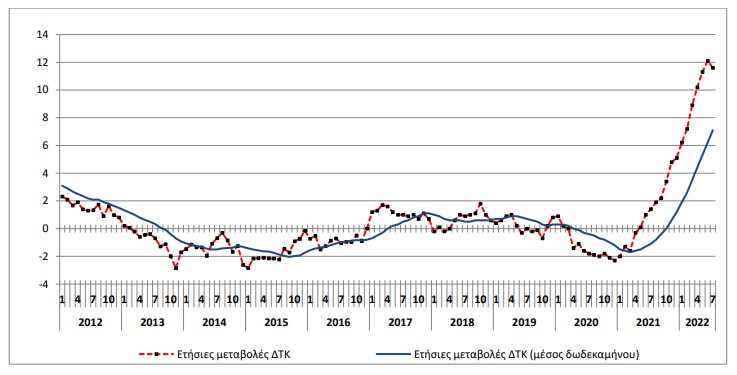
The first slowdown after 15 months was noted inflation in Greece in July, according to data released today, Monday, by the Hellenic Statistical Office (ELSTAT).
In particular, the consumer price index last month went at a pace 11.6%, from 12.1% in June. On a monthly basis and relative to June 2022, the index is down 1.8% from a negative rate of 1.4% a month earlier.

July marks the month that ends a 17-month period in which inflation has been moving up. This uptrend of the last 1.5 years began in March 2021: from -1.6% and with strong steps it rose to 12.1% last month.
Recall that according to Eurostat, inflation in July showed a slight marginal slowdown of 11.5% from 11.6% in June.
However, in Greece the index continues to rise faster than the EU average, while energy prices continue to rise much faster than in the eurozone: by 56.1% against a rise of 39.7% in the eurozone, which also affects prices for other goods and services.
Two factors that could play a role in the projected decline in inflation are the decline in fuel prices after peaking in June, and the decline in electricity prices due to government subsidies. Of course, with regard to electricity, a larger positive impact on inflation is expected in August, as the new mechanism for electricity is in effect from 1 August.
The commission’s forecast for inflation in Greece is 8.9% for 2022, which shows that the price level will remain high in the second half of the year. So far, inflation for the first half of the year is set at 9.3%, which means that in order to test the Commission’s forecasts, inflation in the second half of the year should average at 8.5%.
The price of natural gas is 195 euros per MWh, driving up electricity prices across Europe. The European map has turned “red”: prices in most countries have risen above 300 euros/MWh. In Greece today the price is 350 EUR/MWh, while in Lithuania it has reached 516 EUR/MWh.
However, the Greek economy is showing signs of holding up so far as GDP, tax revenues and tourism are showing positive signals. Drafting of a new plan to support households and businesses is slowly entering its final stages in the face of the accuracy that the prime minister will announce from TIF in early September. In fact, the Ministry of Finance has a second additional budget in its box, with information suggesting an additional cost of around 2 billion euros.
Source: Kathimerini
Lori Barajas is an accomplished journalist, known for her insightful and thought-provoking writing on economy. She currently works as a writer at 247 news reel. With a passion for understanding the economy, Lori’s writing delves deep into the financial issues that matter most, providing readers with a unique perspective on current events.